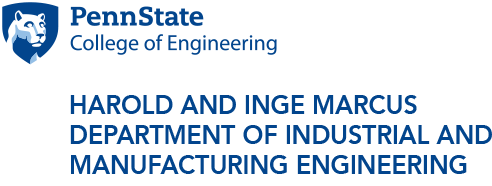
Research
The Harold and Inge Marcus Department of Industrial and Manufacturing Engineering supports research efforts in four areas of interest and several applications.
Research Areas
Human Factors/Ergonomics
Students who focus on human factors in the industrial engineering program study:
- Ergonomics: workplace analysis, mental workload evaluation, biomechanics, modeling crash impacts, human reliability modeling, safety planning, and work physiology
- Human-centered design: ergonomic product design and analysis, design cognition, human and social dynamics in design, and problem-solving enabling methods
- Human-Computer interaction: human-computer interface and information visualization
- Human-Machine systems: human-in-the-loop simulation, behavioral decision-making modeling, human performance modeling, machine learning, and eye-tracking systems
Career options are vast for students who follow the human factors path, from positions in government research centers to software engineering companies to insurance companies and more.
Some examples of positions held by those who focus on human factors and ergonomics include: business intelligence team leader, cognitive engineer, cognitive systems engineer, design manager, ergonomics assessment specialist, ergonomics expert, human-centered designer, human factors design engineer, systems engineer, usability expert, user experience engineer, and user researcher.
Faculty members who specialize in human factors are:
Manufacturing
Students who focus on manufacturing in the industrial engineering program learn through classroom instruction and hands-on projects in:
- Digital design and manufacturing: Areas of expertise include computer-aided design and manufacturing (CAD/CAM), integrated product development, product family and platform design, design analytics, geometric dimensioning and tolerancing, assembly planning, flexible and automated fixturing, automated process planning, non-destructive testing and evaluation, and virtual reality environments for design and manufacturing.
- Manufacturing processes: Advanced and traditional manufacturing processes including 3D printing and additive manufacturing, computer numerical controlled (CNC) machining, forming and joining processes, lightweight material casting, micro-machining and micro-forming, nanotechnology, intelligent materials processing, robotics, automation, and machine tool and discrete part metrology.
- Manufacturing system informatics and control: Focus areas include advanced sensing, process modeling, machine control, computer-integrated manufacturing, scheduling production and maintenance, distributed control systems, inventory and transportation management in supply chains, energy-aware operations of manufacturing enterprises, facility layout, and workplace design.
Students who focus on manufacturing in the industrial engineering program at Penn State have rewarding careers in academia, government, and industry, in areas such as manufacturing operations, production engineering, process control, quality engineering, Lean Six Sigma, product design and specification, cost analysis, and supply chain management, as well as in research and development jobs.
Faculty members who specialize in manufacturing are:
- Saurabh Basu
- Edward De Meter
- Sanjay Joshi
- Ilya Kovalenko
- Soundar Kumara
- Jingjing Li
- Vittal Prabhu
- Hongtao Sun
- Robert Voigt
- Hui Yang
Operations Research
Students who focus on operations research in the industrial engineering program study:
- Applied probability and stochastic systems: queuing systems, stochastic networks, control of telecommunications and information systems, call center modeling, and large-scale service systems
- Financial engineering: auctions, real options, dynamic pricing of transportation services, mobile electronic commerce, and applied economics
- Game theory: dynamic games, network equilibrium, variational inequalities, and equilibrium programming
- Optimization: large-scale optimization, convex optimization, location theory, network optimization, integer programming, optimization of traffic networks, multiple criteria decision making, robust optimization, and compressed sensing
- Statistics and machine learning: statistical learning theory, spatial statistics, time series models, response surface methods, analysis and design of experiments, and large-scale statistical inference
- Quality engineering: total quality systems, process improvement strategies, design for quality, statistical modeling of tolerances, Taguchi loss function, and continuous quality improvement
- Simulation: production modeling, operational scheduling, plant design and layout, process flow analysis, and robust optimization
Graduates who have concentrated on operations research have obtained job titles such as: analytics and operations research engineer, applied research manager, lead performance engineer, operations research analyst, operations research scientist, professor in academia, process improvement engineer, research operations manager, senior director of global business intelligence and analytics, senior operations engineer, and statistician in industry.
Faculty members who specialize in operations research are:
- Serhat Aybat
- Enrique del Castillo
- Prakash Chakraborty
- Qiushi Chen
- Terry Friesz
- Catherine Harmonosky
- Soundar Kumara
- Jingjing Li
- Anirudh Subramanyam
- Jose Ventura
Note: The department houses the Operations Research (OR) Intercollege Graduate Degree Program. This allows students to receive dual master’s or doctoral degrees in their degree program while earning a secondary degree in OR.
Operations, Services, and Analytics
Students who focus on production, supply chain, and service enterprise engineering in the industrial engineering program study:
- Health systems engineering: health information technology, patient flow modeling, capacity management, staff scheduling, quality improvement, data visualization, health informatics, and cost-effective modeling
- Production and distribution systems: material handling systems, material requirements planning, facility planning, capacity expansion, adaptive forecasting, multistage sequencing, and lean manufacturing
- Service engineering: retail engineering, workforce modeling, data mining, demand management, pricing, employee training, employee retention, and resource allocation
- Supply chain engineering and logistics – network design, enterprise integration, supply chain coordination and collaboration, contracting mechanisms, congestion modeling, and transportation modeling
Students who have focused their studies in production, supply chain, and service enterprise engineering have gone on to careers as: analytics managers, associate managers of global statistics, commodity managers, directors of quality assurance, fixture design managers, global/strategic sourcing managers, industrial and operations engineers, new product introduction engineers, process engineers, process improvement managers, quality engineer senior managers of e-commerce, senior material scientists, service business development managers, Six Sigma analysts, and supply chain analysts.
Faculty members who specialize in production, supply chain, and service engineering are:
- Prakash Chakraborty
- Qiushi Chen
- Enrique del Castillo
- Terry Friesz
- Paul Griffin
- Catherine Harmonosky
- Soundar Kumara
- Vittal Prabhu
- Anirudh Subramanyam
- Jose Ventura
- Hui Yang
Research Applications
- Additive Manufacturing
- Big Data Analytics
- Energy Systems
- Health Care Engineering
- Service Enterprise Engineering
- Smart Manufacturing





